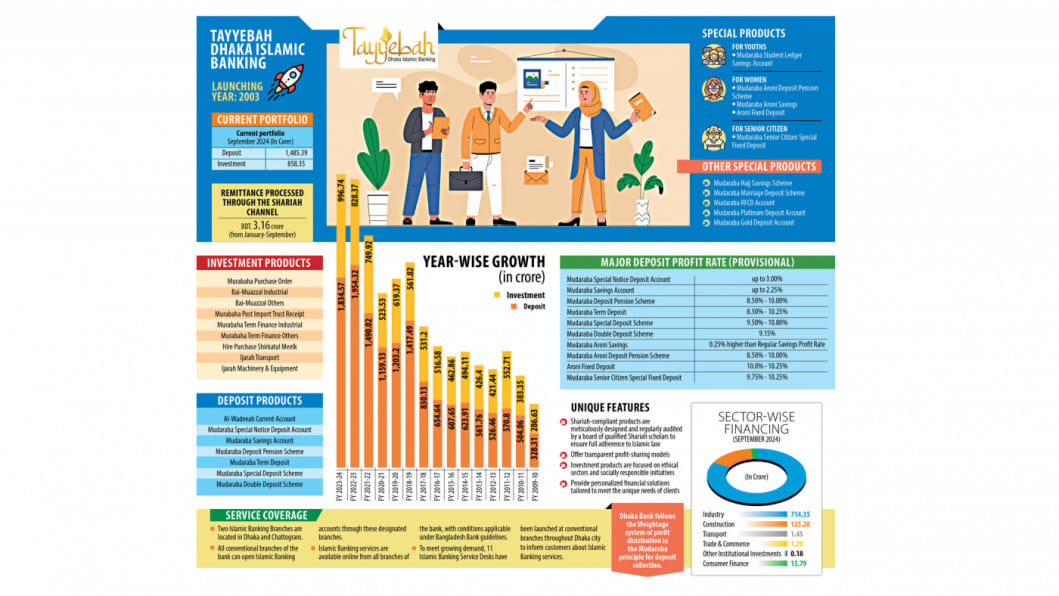The Future of Islamic Banking in Bangladesh

Islamic banking in Bangladesh has emerged as a formidable sector since its inception, playing a pivotal role in mobilizing deposits and financing various economic activities. As of now, it holds a substantial share of the banking sector, representing over 26% of total deposits and 28% of investments. Beyond banking, other Islamic financial sectors—such as Islamic capital markets, Islamic insurance (Takaful), and microfinance—possess untapped potential for growth. However, to harness this potential, supportive policies need to be implemented effectively. This article explores the future of Islamic banking in Bangladesh, emphasizing key areas for development and growth opportunities.
Expanding Outreach into Rural Bangladesh
While Islamic banking has steadily expanded in urban areas, its presence in rural regions has not kept pace with demand. In January-March 2024, investments in agriculture fell to BDT 16.88 billion, down from BDT 22.83 billion in the previous quarter. Islamic banks can significantly enhance agricultural and rural credit financing by establishing branches in underserved communities. This outreach would not only support rural financial needs but also align with the banks' goals of promoting socially beneficial
Enhancing Investments in Mudaraba and Musharaka
A key principle of Islamic banking is to avoid interest-based transactions and instead focus on profit-sharing models like Mudaraba and Musharaka. However, investments through these modes remain minimal; during January-March 2024, Musharaka accounted for only 0.38%, while Mudaraba represented just 0.23% of total investments. To enhance Islamic finance's contribution to Bangladesh's economy, banks must establish clear guidelines and policies to promote Mudaraba and Musharaka investments. Encouraging these modes would not only comply with Shari'ah principles but also diversify the investment offerings of Islamic banks, leading to a more balanced approach to risk and profitability.
Leveraging Microfinance and Supporting Women Entrepreneurs
Microfinance, a cornerstone of Bangladesh's economic landscape, offers Islamic banks an excellent opportunity to enhance financial inclusion and reach new customers. As of March 2024, Islamic banks' investment in the Cottage, Micro, Small, and Medium Enterprises (CMSMEs) sector stands at only 9.60%, indicating significant room for growth.
A targeted focus on women entrepreneurs within microfinance projects could yield substantial benefits. By supporting woman-led enterprises and collaborating with government agencies, Islamic banks can not only foster economic development but also broaden their customer base. This strategy resonates with the inclusive and ethical values of Islamic finance, appealing to socially conscious customers while promoting gender equality and economic empowerment.
Developing Islamic Money and Capital Market Instruments
Effective liquidity management remains a crucial challenge for Islamic banks, which require Shari'ah-compliant financial products to operate smoothly. The recent introduction of Sukuk bonds in Bangladesh has been a promising development, as its popularity among investors indicates. The total amount of Sukuk issued stood at BDT 180.00 billion till end of March 2024. Sukuk offers a way to channel excess liquidity within the Islamic banking system while supporting government budget deficits and promoting the Islamic capital market. By innovating additional money and capital market instruments, Islamic banks can better manage their liquidity, contribute to a stable financial system, and attract investments.
Promoting Green Financing
Though green financing currently comprises a small portion of the Islamic banking sector's portfolio in Bangladesh, these banks are increasingly proactive in advancing it, guided by the Government of Bangladesh's Green Financing Policy.
During January-March 2024, total sustainable financing in the Islamic banking sector reached BDT 231.43 billion, of which BDT 26.51 billion was allocated specifically to green finance. This allocation supported 1,440 green finance beneficiaries and over 169,000 recipients of sustainable-linked finance. As these numbers reflect, Islamic banks are not only expanding their portfolio but are also making significant strides in meeting the government's Environmental, Social, and Governance (ESG) guidelines, demonstrating a commitment to environmentally responsible growth.
By aligning their strategies with national environmental objectives, Islamic banks in Bangladesh have an opportunity to lead the way in financing sustainable projects, reinforcing both environmental goals and the ethical foundation of Islamic finance.
Expanding Corporate Social Responsibility (CSR) Initiatives
Islamic banks in Bangladesh have been expanding their CSR initiatives, drawing from unique Shariah-compliant sources such as Zakat, compensation charges from defaulting clients, and other permissible earnings. These funds are allocated to diverse educational, training, health, and charitable organisations, aiming to serve impoverished and disadvantaged communities often excluded from the conventional banking system.
During January-March 2024, Islamic banks' CSR expenditure reached BDT 0.85 billion, supporting poverty reduction and addressing basic human needs through productivity-oriented projects.
Islamic banks in Bangladesh can further expand their CSR initiatives by prioritising health, education, disaster management, poverty alleviation, and rehabilitation, reinforcing their commitment to social welfare and enhancing their reputation as responsible financial institutions serving the community.
Integrating Technology in Islamic Banking
The integration of modern technology and fintech solutions presents both challenges and opportunities for Islamic banking in Bangladesh. While ensuring compliance with Islamic principles remains crucial, the rise of fintech is enabling Islamic banks to enhance their services significantly. By leveraging digital platforms, these banks can improve operational efficiency, streamline processes, and offer more tailored financial products. Furthermore, fintech solutions can enhance customer experiences by providing convenient access to banking services, especially for underserved populations in rural areas.


 For all latest news, follow The Daily Star's Google News channel.
For all latest news, follow The Daily Star's Google News channel. 



Comments